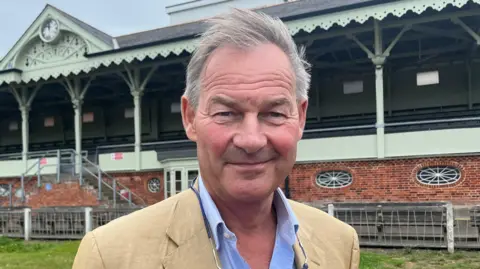In an incident that has drawn significant media attention, Independent MP Rupert Lowe mistakenly identified a charity rowing crew as “illegal migrants.” The event occurred near Great Yarmouth, Norfolk, where Lowe shared a photograph on the social media platform X, depicting a boat close to wind turbines. He hastily commented on this image, stating, “Dinghies coming into Great Yarmouth, RIGHT NOW,” which sparked concerns among the public and prompted him to alert the authorities.
The situation escalated when HM Coastguard was contacted to verify the identities of those aboard the boat. It was later confirmed that the vessel belonged to a charity crew attempting to row from Land’s End, Cornwall, to John O’Groats, Scotland. This mission was not just a sporting endeavor; it held a significant aim of raising funds for Motor Neurone Disease (MND) research. Following the clarification, Lowe publicly acknowledged his mistake and promised to donate £1,000 to the charity in recognition of the crew’s efforts.
In his initial post, Lowe had expressed a sense of urgency and vigilance, emphasizing that if the boat had indeed been carrying illegal migrants, he would use every available resource to ensure their deportation. However, by the time of his follow-up post the next morning, he had realized that the “unknown vessel” he previously referenced was a false alarm. He stated, “No mass deportations for the charity rowers, but we definitely need it for the illegal immigrants!” This comment highlighted his ongoing advocacy for stricter immigration policies, as he has been vocal about the need for mass deportations in the face of what he calls a national crisis.
The rowing crew of four, which included Mike Bates—who holds a British record for solo rowing across the Atlantic—responded humorously to Lowe’s blunder. Bates recounted a moment during their journey when they noticed onlookers on the shoreline staring at them, presumably due to Lowe’s alarming posts. Bates noted, “I’ve not been mistaken for a migrant before,” and even remarked on the comedic aspect of the situation, referencing a comment on social media asking why the Royal Navy wasn’t present, humorously pointing out that he, a former Royal Marine, was already on the boat.
The crew embarked on their rowing journey on July 25, aiming to traverse the Irish Sea. However, their expedition faced setbacks due to adverse weather conditions that required them to halt at Milford Haven in Wales. Nonetheless, the team’s efforts have successfully raised over £100,000 for the targeted charity, with aspirations to increase that amount significantly.
In light of this incident, there has been a clarion call for vigilance concerning illegal immigration, but it serves as a reminder of the complexities surrounding public perception and engagement with humanitarian efforts. The juxtaposition between Lowe’s immediate response to potential illegal activity and his later acknowledgment of a mistake illustrates the fine line politicians often tread when addressing sensitive issues.
The overarching narrative that has emerged from this incident emphasizes the importance of thorough verification before making potentially incendiary claims on public platforms. In a political landscape characterized by heightened tensions surrounding immigration, the blunder of a public figure not only affects his credibility but also casts shadows on the genuine humanitarian causes being pursued within the community.
As this story continues to unfold, it underscores the need for increased public discourse surrounding immigration policies, the significance of charitable endeavors, and the responsibilities that come with public communication, particularly from those in positions of power. It also highlights the necessity for accountability and the potential ramifications when actions and statements are not carefully considered.











